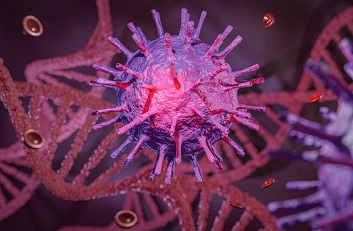Understanding the Link Between COVID-19 and Cancer: The Role of the SLC6A20 Gene
COVID-19 News - SLC6A20 Gene Apr 13, 2023 2 years, 5 days, 16 hours, 42 minutes ago
COVID-19 News: Since the beginning of the COVID-19 pandemic, researchers have been trying to understand the factors that increase the risk of severe illness and death. One of the areas that has drawn significant attention is the increased vulnerability of cancer patients to COVID-19. The SLC6A20 gene, found on chromosome 3p31.21, has been identified as a key causal gene associated with the severity of COVID-19.

This article aims to provide an easy-to-understand explanation of the research conducted by researchers from Middle East Technical University, Ankara - Turkey to explore the connection between the SLC6A20 gene and COVID-19 in cancer patients.
Background
Cancer is an inflammatory disease that often impairs the immune system. Studies and past
COVID-19 News coverages have shown that cancer patients are more susceptible to COVID-19 compared to the general population. Genes such as ACE2, TMPRSS2, and TMPRSS4 have been found to be upregulated in different cancer types, which may contribute to this increased vulnerability. Recently, the SLC6A20 gene has been identified as one of the key genes associated with COVID-19 severity.
https://pubmed.ncbi.nlm.nih.gov/34425859/
SLC6A20 Gene and Cancer
The SLC6A20 gene is involved in the regulation of glycine and proline transport. It has been suggested that the SLC6A20 gene may play a role in the entry and infection of SARS-CoV-2, the virus responsible for COVID-19. Researchers aimed to study the expression profile of the SLC6A20 gene in different types of cancer and its association with SARS-CoV-2 infection genes and immune modulation.
Findings
The study found that the SLC6A20 gene was highly expressed in a variety of human tumor samples, with a positive correlation to SARS-CoV-2 infection genes such as ACE2, TMPRSS2, and TMPRSS4. This suggests that the SLC6A20 gene might be involved in modulating COVID-19 disease and hence increase susceptibility for cancer patients.
The relationship between the SLC6A20 gene and immune response in different malignancies was also analyzed. The analysis showed a high correlation between SLC6A20 and neutrophil infiltration in many types of cancer. Elevated immune infiltration is linked to the prognosis of human cancers and has been identified as an early indicator of COVID-19.
Additionally, the study found that the SLC6A20 gene interacts with a protein called TMEM27, an ACE2 homologue. TMEM27 was upregulated in various cancer types and was correlated with ACE2 and TMPRSS2, known SARS-CoV-2-associated proteins. This further supports the potential link between the SLC6A20 gene and COVID-19 in cancer patients.
Conclusion
In summary, the study findings imply a potential role for SLC6A20 in the heightened vulnerability of cancer patients to COVID-19. The researchers investigated SLC6A20, which is regulated by the 3p31.21 locus and associated with COVID-19 severity, across various cancer types. The examination of pan-cancer tumor samples compared to normal tissue revealed increased SLC6A20 expression in nume
rous cancer types. Moreover, SLC6A20 expression demonstrated a positive correlation with COVID-19-related genes, including ACE2, TMPRSS2, and TMPRSS4, in multiple tumor samples. Considering the roles of ACE2, TMPRSS2, and TMPRSS4 in enhancing COVID-19 susceptibility among cancer patients, our data suggest that SLC6A20 may serve a similar function. Notably, SLC6A20 expression was linked to heightened immune modulation, particularly through increased IFN-λ and inflammatory signatures in various cancer types.
Lastly, the study found that SLC6A20 interacts with ACE2 homologue protein TMEM27, which was also upregulated in different cancer types and positively correlated primarily with ACE2 and TMPRSS2, both known SARS-CoV-2-associated proteins. In summary, the research offers a comprehensive analysis of the COVID-19 causal gene SLC6A20 in pan-cancer samples.
The study findings were published in the peer reviewed journal: ACS Omega (a journal of the America Chemical Society)
https://pubs.acs.org/doi/10.1021/acsomega.3c00407
Further research is needed to confirm these findings and explore potential therapeutic interventions targeting the SLC6A20 gene in cancer patients with COVID-19.
For the latest
COVID-19 News, keep on logging to Thailand Medical News.
